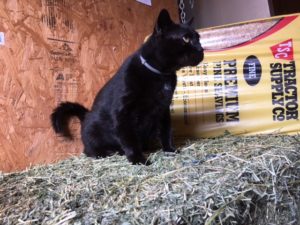 Tuesdays with Tony
Tuesdays with Tony
Hay There!
As promised, last week I managed to get Dr. Lacher cornered for a moment to discuss hay at her farm. I thought this would be easy since she gave me a one word answer, alfalfa, but it did get more complicated than I thought.
To start with, let’s talk about Dr. Lacher’s hay feeding program. Dr. Lacher recommends basing your feeding program on your forage, not your grain. It is always cheaper to go with higher quality hay than more grain. So she evaluated the nutritional needs of her herd, and found that the majority of the horses were going to require a high protein and high nutritional value forage. Next, she checked with local hay producers to determine the nutritional value of their hay. Good hay farmers check the protein and nutritional values on their hays, and are happy to discuss their results with you.
In our area there are two primary hay types to choose from: coastal and peanut.
Dr. Lacher determined that peanut was the answer to her horses’ nutritional needs. Unfortunately, one of her horses breaks out in horrible diarrhea if he eats even one bite, so she prefers not to have any on her farm. Peanut is a locally grown legume, unlike alfalfa, which prefers cooler temperatures than Florida has to offer. Because it’s locally grown, shipping costs are dramatically lower for peanut, giving you equivalent hay for less money. Legumes come with many added benefits. These hays create a laxative effect on the GI tract and are a bit salty. Together, this helps reduce the incidence of colic. Legumes are also a pretty darn balanced diet for horses. Dr. Lacher told me that she rarely sees colics in horses who are fed peanut or alfalfa. The few she has seen were on too little roughage for the weight of the horse (the right answer there is 10-12 pounds per horse per day or 1-1.5% of body weight). Three of Dr. Lacher’s horses maintain on nothing but alfalfa and 1 pound of ration balancer per day, including a 4 year old and a pregnant broodmare. This works because legumes are high enough in protein to meet the nutritional demands of a variety of horses.
Coastal is the major type of hay grown in this area. Coastal is a grass hay, and is usually lower in protein than legumes. There are several different types, with Tifton 85 usually being the best for horses. Coastal is a great hay for horses with a low caloric demand. It provides the GI tract with something to work on (very important for horses), gives your horse’s mind something to work on, and provides some nutrition. Coastal has one big problem: ileal impactions. This is a type of colic almost exclusively seen in horses eating coastal with no other type of roughage. Coastal remains the best choice for most horses, along with a few add-ons to reduce this risk. Adding a few pounds of alfalfa or peanut hay, or 3-4 cups of soaked beet pulp twice daily will help keep your horse’s GI tract moving. If your horse is a very easy keeper, this combination along with a small amount of a ration balancer, such as Purina’s Enrich 32 or Seminole’s Equalizer, will be all you need to feed. Remember to check with your hay producer to determine the nutritional value of your hay. We have some amazing farmers in this area growing coastal with protein and a nutritional profile surprisingly close to peanut hay.
Somewhere between these two choices are the mixed grass hays. The most common one is T & A (or Timothy and Alfalfa) but other versions are Orchard Grass and Alfalfa (O & A), and even coastal and alfalfa. These hays are an excellent choice for the horse who colics on coastal hay, or needs more nutrition than coastal but less than legumes.
Dr. Lacher finished our discussion on hay by reminding me that with summer coming, the number one roughage our horses will consume will be pasture. Your pasture can be a significant source of nutrition if it is fertilized and maintained. She wanted me to make sure everyone knew that the seed heads are very high in protein, fat, and calories. This is important to remember if you have an insulin resistant or laminitic horse!
Dr. Lacher also said that Beth, our Certafied Nutrition Expert, will be happy to evaluate your horse, farm, and lifestyle and formulate the ideal feeding program.
And most importantly I hope that your food bowl is always full, and your litter box clean.
Tony
